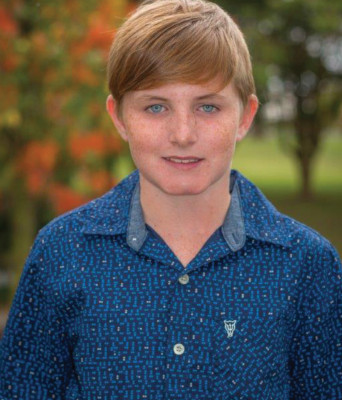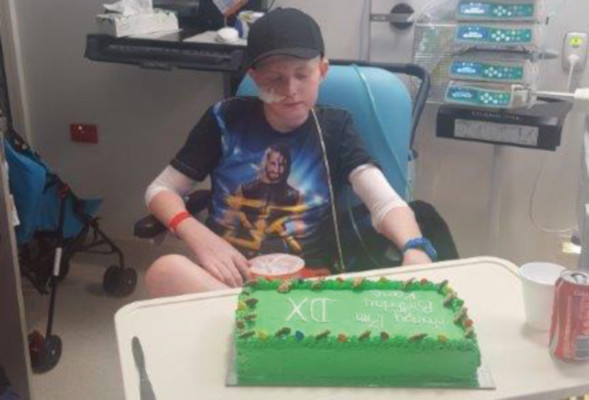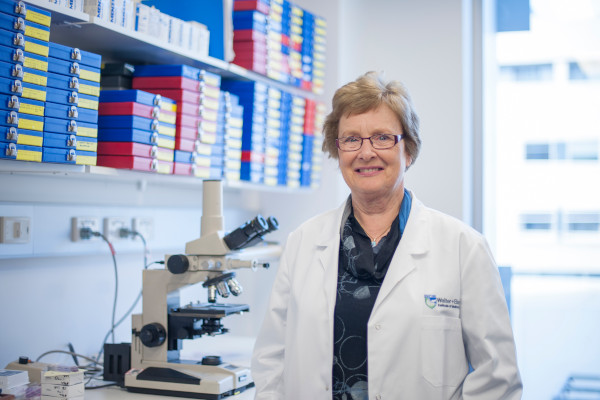“Kane’s doctor said she had never seen such an aggressive type of lymphoma,” recalled Natalie. “It was terrible.”
Kane was diagnosed with a rare form of lymphoma when he was 12 years old. Tragically, Kane’s cancer was aggressive, and he died a few weeks after his 13th birthday.
For his parents, Natalie and Rick, his death has had an obviously profound impact on them.
The day of Kane’s diagnosis will remain etched on Natalie’s mind forever. “I was in shock,” she said. “You never think it will happen to your child. It never crossed my mind.”

Kane was only 12 when he was diagnosed with a rare form of lymphoma.
Donate now
All that mattered was getting Kane’s treatment started to help him get better. “Seeing your child hooked up to chemo the first time is very daunting, but we soon learnt that we just needed to be strong for Kane.”
At first, Kane responded well to chemotherapy and his family was ecstatic. But just three weeks later, he became unwell again. He was rushed to intensive care and had to have fluid drained from his lungs. The doctors had to tell Natalie the terrible news. Kane’s lymphoma was back – with a vengeance.
“Kane’s doctor said she had never seen such an aggressive type of lymphoma,” recalled Natalie. “It was terrible.”
Once again, Kane initially responded well to the new chemotherapy treatment he was given. He turned 13 while he was in hospital, and Natalie organised a birthday celebration for him.
Although he made a huge effort to enjoy the occasion, Natalie could see that Kane was really struggling. He was unwell and utterly exhausted.
Sadly, just three weeks later, despite every effort by the doctors and nurses, Kane died in Natalie’s arms.

Kane celebrted his 13th birthday in hospital. Three weeks later he died from lymphoma.
This is a heartbreaking story. But there is hope for families who face the same situation in the future.
Professor Suzanne Cory’s work is focused on lymphoma, the type of cancer Kane had. She and her team were the first researchers to discover that the fundamental cause of lymphoma is over-production of a protein called MYC in cells.
Professor Cory has been working in this area since the 1980s. Her team made their first discovery then, and it has led to this ground-breaking project now.
“After 40 years of research into MYC,” she says, “I certainly hope that we have finally exposed its Achilles’ heel, and that cancer patients will one day benefit.”

ProfessorCory and her team are hopeful their discoveries will lead to new treatments for cancers like lymphoma.
Lymphoma kills 1,600 people each year in Australia, including children just like Kane. That is too many lives cut short, and too many families torn apart by grief. Professor Cory wants to change this with the help of the generosity of people like you.
“We have seen truly mind-blowing advances in biomedicine and health, and Australia has played a significant role. But much remains to be done – there are still no magic bullets for many types of cancer. Cancer researchers want to change that.
“I feel confident that by exploring this new angle, which has already achieved surprising results, we can discover how effective an MNT inhibitor might be. We can look forward to more cancers being treated with targeted drugs.
“My hope for the future is that they will enable cancer patients to live normal, productive, happy and pain-free lives for a very great deal longer.”
If his team can find a way to stop these pumps from feeding the cancer cells with nutrients, not only will this stop the cancer cells from spreading, but it could be a way of killing the cancer cells, too.
It’s Natalie’s wish that cancer research like Professor Cory’s will prevent other families going through what she did.
“Four years on and I am still so proud of my boy. He was such a good person and so loved by everyone who knew him – all his family, especially his cousins, his friends and teachers. Many people loved him and miss him every day.”
Will you help Professor Cory create a new treatment for lymphoma so mother's like Natlie don't have to live without their children in the future.
Donate now